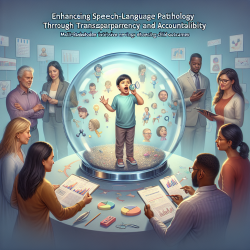Introduction
Artificial Intelligence (AI) is rapidly transforming various sectors, including education and therapy. As a speech-language pathologist, understanding the implications of AI policies can significantly enhance your practice, especially in online therapy services like those offered by TinyEYE. The research article "Achieving a ‘Good AI Society’: Comparing the Aims and Progress of the EU and the US" provides insights into AI strategies that can be leveraged to improve speech therapy outcomes for children.
Understanding AI Policies: EU vs. US
The research highlights the contrasting approaches of the European Union (EU) and the United States (US) in developing a 'Good AI Society.' The EU focuses on safeguarding individual rights and ensuring ethical AI use, while the US emphasizes innovation and economic competitiveness. Both approaches have implications for the use of AI in speech therapy.
Implementing AI in Speech Therapy
AI technologies, such as natural language processing and machine learning, can be integrated into speech therapy to enhance assessment and intervention strategies. Here's how practitioners can benefit from AI:
- Personalized Therapy: AI can analyze large datasets to tailor therapy sessions to individual needs, improving outcomes for children.
- Efficiency: Automating routine tasks allows therapists to focus more on direct interaction with children, enhancing the therapeutic relationship.
- Data-Driven Decisions: AI provides data analytics tools that help in tracking progress and making informed decisions about therapy adjustments.
Ethical Considerations
While AI offers numerous benefits, ethical considerations are paramount. The EU's approach emphasizes transparency, accountability, and fairness, which are crucial in maintaining trust in AI applications in therapy. Practitioners should ensure:
- Data Privacy: Protecting children's data is essential. Adhering to regulations like the EU's GDPR can help maintain privacy.
- Bias Mitigation: AI systems should be regularly audited to prevent biases that could affect therapy outcomes.
- Informed Consent: Parents and guardians should be informed about how AI is used in their child's therapy.
Encouraging Further Research
Practitioners are encouraged to stay informed about AI advancements and their implications in speech therapy. Engaging with ongoing research can provide insights into emerging technologies and ethical frameworks. Collaborating with researchers can also lead to the development of innovative AI tools tailored for speech therapy.
Conclusion
AI has the potential to revolutionize speech therapy, offering personalized and efficient solutions for children. By understanding and implementing the ethical and strategic aspects of AI policies, practitioners can enhance their practice and contribute to better outcomes for their clients.
To read the original research paper, please follow this link: Achieving a ‘Good AI Society’: Comparing the Aims and Progress of the EU and the US.










